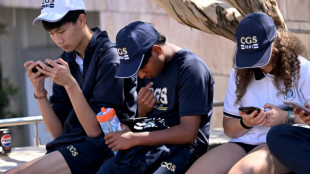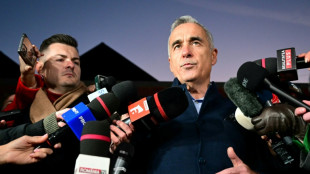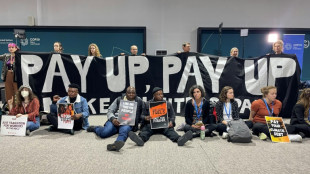
-
 Detroit survive Bears comeback to make it 10 wins in a row
Detroit survive Bears comeback to make it 10 wins in a row
-
Mexican actor Silvia Pinal dead at 93

-
 'Black Friday' deals target inflation-weary US consumers
'Black Friday' deals target inflation-weary US consumers
-
Liverpool look to deepen Man City crisis, Amorim seeks first Premier League win

-
 Police fire rubber bullets, tear gas at Georgia protesters after PM delays EU bid
Police fire rubber bullets, tear gas at Georgia protesters after PM delays EU bid
-
England lose three quick wickets in reply to New Zealand's 348

-
 Social media companies slam Australia's under-16 ban
Social media companies slam Australia's under-16 ban
-
Police fire tear gas at Georgia protesters after PM delays EU bid

-
 Canada watchdog sues Google over 'anti-competitive' ad tech
Canada watchdog sues Google over 'anti-competitive' ad tech
-
Hojlund gives Amorim winning Old Trafford bow, Roma hold Spurs

-
 Amorim wins first Man Utd home game after rollercoaster ride
Amorim wins first Man Utd home game after rollercoaster ride
-
France arrests 26 as South Asian migrant trafficking ring smashed

-
 At least 15 dead, 113 missing, in Uganda landslides
At least 15 dead, 113 missing, in Uganda landslides
-
Netanyahu threatens 'intensive war' if Hezbollah breaches fragile truce

-
 Bilbao join Lazio at Europa League summit, Chelsea cruise in Conference League
Bilbao join Lazio at Europa League summit, Chelsea cruise in Conference League
-
In Lebanon's Tyre returning residents find no water, little power

-
 Protests in Georgia after PM delays EU bid to 2028
Protests in Georgia after PM delays EU bid to 2028
-
Biden slams Trump tariff threats as 'counterproductive'

-
 TikTok tactics shake up politics in Romania
TikTok tactics shake up politics in Romania
-
'He should do comedy' says Norris of Verstappen comments

-
 Americans celebrate Thanksgiving after bitter election
Americans celebrate Thanksgiving after bitter election
-
Flood-hit Spain introduces 'climate leave' for workers

-
 UK's Starmer vows to slash net migration
UK's Starmer vows to slash net migration
-
Recount order, TikTok claims throw Romania election into chaos

-
 Jansen stars for South Africa as Sri Lanka crumble to 42 all out
Jansen stars for South Africa as Sri Lanka crumble to 42 all out
-
Bottas set for Mercedes return as Mick Schumacher quits reserve role

-
 Putin threatens Kyiv with new hypersonic missile
Putin threatens Kyiv with new hypersonic missile
-
Georgia delays EU bid until 2028 amid post-election crisis

-
 French PM announces concession in bid to end budget standoff
French PM announces concession in bid to end budget standoff
-
Guardiola's ingenuity will solve Man City crisis, says Slot

-
 South Africa in control after Sri Lanka crash to 42 all out
South Africa in control after Sri Lanka crash to 42 all out
-
'Nothing left': Flood-hit Spanish town struggles one month on

-
 Israel conducts first strike on Lebanon since ceasefire
Israel conducts first strike on Lebanon since ceasefire
-
'Unrecognisable' Mbappe and Real Madrid hurting after European woes

-
 Uber and Bolt unveil women-only service in Paris
Uber and Bolt unveil women-only service in Paris
-
French cognac workers protest China bottling plan amid tariff threat

-
 World tennis No.2 Swiatek accepts one-month doping suspension
World tennis No.2 Swiatek accepts one-month doping suspension
-
Suaalii to start for Wallabies against Ireland

-
 Farrell backs youngster Prendergast at fly-half for Aussie Test
Farrell backs youngster Prendergast at fly-half for Aussie Test
-
Suualii to start for Wallabies against Ireland

-
 Camavinga joins Real Madrid injury list
Camavinga joins Real Madrid injury list
-
Australia passes landmark social media ban for under 16s

-
 Nigerian president woos French investment on state visit
Nigerian president woos French investment on state visit
-
Contentious COP29 deal casts doubt over climate plans

-
 PSG, Real Madrid toil as giants struggle to get to grips with new Champions League
PSG, Real Madrid toil as giants struggle to get to grips with new Champions League
-
Lampard appointed manager of 'ambitious' Coventry

-
 Liberian ex-warlord Prince Johnson dies aged 72
Liberian ex-warlord Prince Johnson dies aged 72
-
K-pop band NewJeans leaves label over 'mistreatment'

-
 Sri Lanka crash to record low Test total of 42 in South Africa
Sri Lanka crash to record low Test total of 42 in South Africa
-
Putin says barrage 'response' to West-supplied missiles


Families separated by front line in Russia's Kursk region
Anastasia Gridina breaks down when she talks about keeping in touch with her three-year-old daughter Darina -- who is stranded in Ukrainian-occupied territory in Russia's Kursk region.
For a month after Ukrainian forces launched their surprise offensive there in August, Gridina had no contact at all with Darina and did not know if her daughter was alive or dead.
"I want to be reunited with my daughter, to see her in any city, any region. The main thing is that she should be out of the war zone," the 21-year-old accountant told AFP.
The incursion by Ukrainian forces came two and a half years after Russia launched its full-scale campaign against Ukraine.
The number of civilians still living in the estimated 1,000 square kilometres (386 square miles) that Ukraine says it controls is not officially known but Kyiv estimates there are "several thousand".
The offensive was so sudden that many people had no time to evacuate, leaving families like Gridina's divided.
Contact with people living in the area is nearly impossible because there is no phone network and civilians can neither cross the front line nor travel to Ukraine.
Yulia Zaitseva, a volunteer psychologist working in the city of Kursk, said that of the 10-15 people a day who she sees "three are dealing with the fact they have been separated from loved ones".
"The feeling of uncertainty is at times harder for people than a tragic certainty because they do not know what is going on, what to prepare for. Should they prepare for something terrible or for something good? This uncertainty has a big impact," she said.
- 'We just have silence' -
Alexei Gaponov, head of the Russian Red Cross for the Kursk region, said his organisation had received 5,500 requests for information about relatives people had lost contact with.
He cautioned that the figure could include people who have been evacuated but had not since been in contact with their loved ones and people living in areas since re-captured by Russian forces.
Gaponov said there was little his staff could do in cases of people stuck in Ukrainian-held territory except add them to lists.
"Then we just check the situation on the front," he said.
At a humanitarian aid point in Kursk, 35-year-old Marina said her father, uncle and 90-year-old grandmother were still in an area controlled by Kyiv's troops.
"We worry about their condition," the office worker said.
"There is no mobile network where they are. Nobody is leaving from there. We just have silence, a vacuum."
Some relatives say they only found out about their loved ones through Ukrainian media reports from the occupied territories.
Oleksiy Dmytrashkivsky, a spokesman for the Ukrainian army's command centre in Kursk, said he received "at least 20 requests per day from people looking for their relatives and loved ones".
He said sometimes he receives calls from relatives asking the Ukrainian army to bring medicines to their loved ones while others simply ask for regular updates about their wellbeing.
He said many civilians were now being put up in a school in Sudzha stocked with food and medicine and heating stoves.
"Many people ask for their relatives to be taken to Ukraine," he said.
But he said Ukraine could not do that because that "would be a deportation, it is a criminal offence".
- 'No way through' -
Gridina said she had gone to Moscow temporarily to work as an accountant when Ukrainian troops advanced into Kursk. Her daughter was with her grandmother in the village of Lebedevka.
"I take videos, send them to some people and they show the videos to her and send one back. That's the only way. I can't hear my daughter's voice live," she said.
She said "a lot of people" -- mainly elderly people and children -- had stayed behind in villages in her area since "there was no evacuation".
The young mother said she made pleas for help "everywhere", including Russian institutions and the Red Cross and by writing personally to President Vladimir Putin.
"I have had no replies," she said.
Desperate to see her daughter, she at one point even tried to cross the front line but was forced to turn back.
"There were explosions, shelling and no way through. There were also mines on the roads. A lot of cars were burning. Everything was burning and there was no way through," she said.
M.Odermatt--BTB
